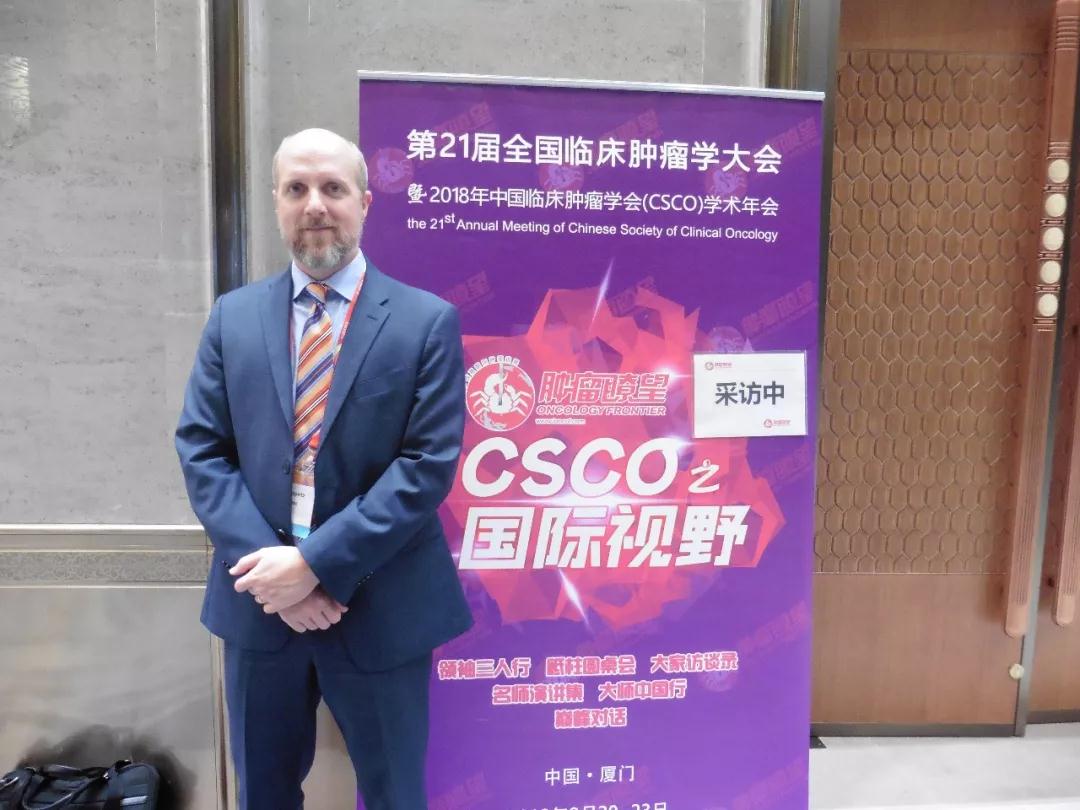Oncology Frontier: Can you give us a brief overview of the current status of precision medicine for colorectal cancer at this CSCO Conference?
Dr Kopetz: When we think about precision therapy for colorectal cancer, it is about delivering the right therapy to the right patient based on the tumor type and other features. Currently, the biomarkers we are assessing for colorectal cancer include sequencing of KRAS, NRAS and BRAF mutations. This provides a lot of information about the use of various targeted therapies including EGFR inhibitors. We utilize the KRAS and NRAS mutations to identify patients who are candidates for EGFR inhibition. The current best practice is to integrate both the site of the colon where the tumor is located (right or left) with the mutation status. Patients who are wild-type in KRAS and NRAS and have tumors in the left side of the colon or the rectum are the patients who benefit the most from a combination including an EGFR inhibitor. BRAF mutations represent a particularly poor prognostic subgroup. This is a group for whom combination therapy with a BRAF and EGFR inhibitor is warranted. There is minimal activity with an EGFR inhibitor alone, but the combination is showing substantial promise, potentially also with the addition of a MEK inhibitor. These therapies are currently standard of care in the United States, and the options will only increase with time. Other areas for the application of precision oncology include HER2 amplifications. This is a subgroup of around 4% of colon cancers. It is a group with a limited response to EGFR inhibitors, but there is activity with dual therapies targeting HER2 including data and ongoing clinical trials of trastuzumab and pertuzumab, for example. We anticipate some of these predictive and therapeutic options being incorporated into guidelines over the next year or two. Finally, there is increasing data on the use of fusions for identifying rare subsets of patients who might benefit particularly well from targeted therapies. Like many other solid tumors, there is good evidence of activity and durability. However, these are very rare, and fusions in general in colorectal cancer are <1% in prevalence. Other key biomarkers include microsatellite instability (MSI), which we use to guide immunotherapy. There is a very clear dichotomy in colorectal cancer whereby MSI-high (MSI-H) tumors have a nice response with durability with either PD-1 inhibition, or PD-1 and CTLA-4 inhibition (nivolumab and ipilimumab). This is now considered standard of care management for treatment refractory MSI-H colorectal cancer. There are future efforts ongoing looking at other modalities, such as RNA-based profiling with consensus molecular subtyping. This remains experimental, but promising.
Oncology Frontier: With regard to the major advances in treatment strategies using immunotherapy for colorectal cancer, what are the main points?
Dr Kopetz: Immunotherapy is the primary modality of treatment for patients with MSI-H colorectal cancer. There are the approved agents pembrolizumab and nivolumab for this population. Most recently, there has been approval in the US for the combination of PD-1 and CTLA-4 with nivolumab and ipilimumab. The toxicity of the doublet is slightly higher, but we do see higher rates of disease control. There is some increasing utilization of this combination in clinical practice now. There are studies looking at the role of immunotherapy with PD-1 inhibition either alone in first-line, or in combination with chemotherapy. These studies were recently completed or are ongoing to try to answer this question. Another question is how to utilize immunotherapy in the microsatellite-stable population? This represents around 97% of our metastatic patients. Here, there has been less activity. There have been a number of negative clinical studies. There are hints of activity in a number of different areas, but this remains experimental. One thing we can say is that there is a very rare subgroup of patients that have a polymerase-epsilon (POLE) mutation. These are hyper-mutators with even higher rates of mutation than seen in MSI-H. Although rare, it seems these are patients who will also benefit from PD-1-based therapy. We anticipate that this will be incorporated into guidelines in the near future as well.
Oncology Frontier: Screening the right population to choose the right drug is the main connotation of precision medicine. At present, what are the commonly used biomarkers for predicting the treatment efficacy and prognosis of colorectal cancer?
Dr Kopetz: At a minimum, patients should have their tumors tested for microsatellite instability. This can be done with immunohistochemistry, which appears to be sufficiently sensitive for the detection of MSI-H. Other tests include the use of PCR-based methodology. It is not clear if both tests are needed, but it appears that either one alone is sufficient for screening. The second mandatory test is tissue genotyping, incorporating KRAS and NRAS testing. Importantly, this should include exons 2,3 and 4 to ensure that all the activating mutations are captured. The BRAF mutation is specifically included in Codon 600 and should also be incorporated into testing. This information can be used both for prognosis and sensitivity to EGFR inhibitors. In some centers, this testing can also incorporate things like HER2 amplification and fusions, but these tests are only starting to appear in guidelines.

编者按:值改革开放40周年之际,借厦门特区一方福地,CSCO国际会议专场不断充实提升,成为肿瘤学交流的世界之窗。本次CSCO-ASCO联合研讨会聚焦“提高结直肠癌全程管理水平(Improve the art of whole-course management on colorectal cancer)”这一热点话题。美国德克萨斯大学MD安德森癌症中心Scott Kopetz教授带来了“2018年结直肠癌精准治疗最新进展”的精彩演讲,会后,我们特邀Kopetz教授进行现场访谈!
肿瘤瞭望:您在本次CSCO大会上报告了结直肠癌的精准治疗现状,可以给我们简单概述一下主要的内容吗?
Kopetz教授:结直肠癌的精准治疗是指基于肿瘤类型和其他特征给予患者正确的治疗。目前,我们正在评估的结肠直肠癌的生物标志物包括KRAS、NRAS和BRAF突变等,能够提供许多关于使用各种靶向治疗(包括EGFR抑制剂)的信息。我们利用KRAS和NRAS突变来筛选适合EGFR抑制剂的患者,最好是将肿瘤病灶部位(右侧或左侧)与突变状态相结合。KRAS和NRAS野生型且肿瘤在左侧结肠或直肠的患者能够从EGFR抑制剂的联合方案中获益最多。 BRAF突变提示患者预后很差,需要使用BRAF和EGFR抑制剂联合治疗,EGFR抑制剂单药很难取效,联合MEK抑制剂很有前景。联合治疗目前是美国的标准方案,且药物的选择会越来越多。
其他的生物标志物包括HER2扩增,约占4%的结肠癌人群,对EGFR抑制剂反应有限,然而对靶向HER2的联合治疗具有活性,例如目前已有曲妥珠单抗和帕妥珠单抗相关的数据和正在进行的临床试验,预计某些治疗方案在未来一两年内将纳入指南。
关于使用基因融合突变来识别可能从靶向治疗中获益的罕见患者亚群的数据也越来越多,像许多其他实体肿瘤一样,显示出充分的活性和持续缓解证据。然而,这部分结直肠癌患者非常罕见,融合基因的发病率不到1%。
其他关键生物标志物包括微卫星不稳定性(MSI),可指导免疫治疗疗效。在结直肠癌中存在非常明显的差异,其中MSI-H亚型对PD-1抑制剂或PD-1和CTLA-4抑制剂(nivolumab和ipilimumab)联合能够持续缓解,被认为是治疗难治性MSI-H结直肠癌患者的标准方案。有研究者正在努力研究其他如基于RNA分析以及共识分子亚型等的精准治疗方案,虽然大多都处在试验阶段,但很有前景。
肿瘤瞭望:您如何看待免疫治疗在肠癌中的应用?
Kopetz教授:免疫疗法是MSI-H型结直肠癌患者的主要治疗方式,目前批准的药物包括pembrolizumab和nivolumab。最近,美国已经批准PD-1和CTLA-4抑制剂nivolumab和ipilimumab的联合方案。双药方案的毒性略高,但确实能够获得更高的疾病控制率,现在临床实践中这种组合的使用越来越多。目前有一些已经完成的或正在进行的研究关注一线使用PD-1抑制剂单药或与化疗联合的作用。另一个问题是如何在微卫星稳定群体中使用免疫治疗?这类患者约占97%,许多应用免疫治疗的临床研究都得出了阴性结果。
一些其他的生物标志物也表现出一定的应用前景,但仍然处于试验阶段。例如,有一种非常罕见的突变亚型POLE,突变率比MSI-H更高,这些患者似乎能够从靶向PD-1的免疫治疗中获益,预计这也将在不久的将来纳入指南。
肿瘤瞭望:筛选合适的人群选择合适的药物是精准治疗的主要内涵,请问目前结直肠癌常用的疗效预测以及预后生物标志物有哪些?
Kopetz教授:在临床实践中,患者至少应检测肿瘤的微卫星不稳定性,可以通过免疫组化来完成,它对于MSI-H的检测足够敏感。 其他检测手段包括PCR等,目前尚不清楚是否需要进行两项检测,似乎任何一种方法都足以进行结直肠癌筛查。 第二项强制性检测是组织基因分型,包括KRAS和NRAS。 需要注意的是,这应包括外显子2,3和4,以确保捕获所有激活突变。 BRAF基因特别是密码子600突变,也应纳入检测,可预测预后和对EGFR抑制剂的敏感性。 在某些中心,基因检测还包括HER2扩增和融合等内容,有的已经开始纳入指南中。





 京公网安备 11010502033352号
京公网安备 11010502033352号